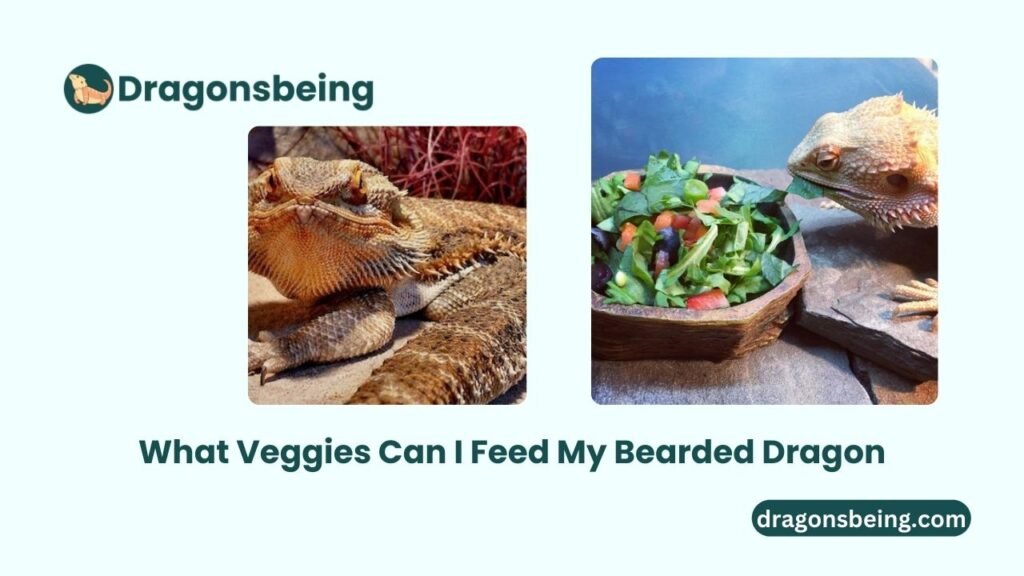Feed your bearded dragon leafy greens like collard greens, mustard greens, and dandelion greens. You can also offer bell peppers, squash, and carrots.
Bearded dragons thrive on a varied diet that includes both insects and vegetables. Vegetables play a crucial role in their nutrition, providing essential vitamins and minerals. Offering a range of veggies keeps your dragon healthy and active. Not all vegetables are suitable, so knowing which ones to choose is vital.
A balanced diet enhances their well-being and prevents health issues. Always wash vegetables thoroughly to remove pesticides. Chop them into manageable pieces to make eating easier. Providing a colorful mix of veggies not only attracts your bearded dragon but also ensures they receive diverse nutrients.
Introduction To Bearded Dragon Diets
Bearded dragons are popular pets. They require a balanced diet to stay healthy. Knowing what veggies to feed them is essential. A good diet includes greens, fruits, and insects. Understanding their dietary needs helps owners provide better care.
Ideal Nutritional Balance
Bearded dragons need a mix of nutrients. Their diet should consist of:
- Leafy Greens: 50% of their diet
- Vegetables: 25% of their diet
- Fruits: 10% of their diet
- Protein: 15% of their diet
Here’s a table of suitable veggies:
| Vegetable | Nutritional Value |
|---|---|
| Collard Greens | High in calcium |
| Mustard Greens | Rich in vitamins A and C |
| Carrots | Good for beta-carotene |
| Bell Peppers | High in vitamin C |
| Zucchini | Hydrating and low-calorie |
Common Dietary Mistakes
Many owners make common mistakes in feeding. Here are some errors to avoid:
- Feeding too many fruits. Fruits are high in sugar.
- Neglecting leafy greens. They are essential for health.
- Offering starchy veggies. Limit potatoes and corn.
- Ignoring variety. Different foods provide varied nutrients.
- Using toxic plants. Avoid avocados and rhubarb.
Understanding these mistakes can lead to better care. Healthy diets lead to happier bearded dragons.
Safe Leafy Greens For Your Dragon
Feeding your bearded dragon the right leafy greens is essential. These greens provide vital nutrients for your pet’s health. Here are some safe options to consider.
Collard Greens
Collard greens are a fantastic choice for your bearded dragon. They are rich in calcium and vitamins. Here are some key facts:
| Nutritional Value | Per 100g |
|---|---|
| Calcium | 141 mg |
| Vitamin A | 478 µg |
| Fiber | 4 g |
These greens are safe and nutritious. Chop them finely for easier eating. Always wash them before feeding.
Mustard Greens
Mustard greens are another excellent option. They contain vitamins and minerals beneficial for dragons. Check the details below:
| Nutritional Value | Per 100g |
|---|---|
| Calcium | 115 mg |
| Vitamin C | 70 mg |
| Fiber | 2 g |
Mustard greens are slightly spicy, which some dragons enjoy. Always chop them up for easier consumption. Rinse them well before serving.
Incorporating these leafy greens into your dragon’s diet boosts health. Keep experimenting with different combinations for variety.
Vegetables That Promote Health
Feeding your bearded dragon the right vegetables ensures a healthy life. Certain veggies are packed with vitamins and minerals. These nutrients help support their immune system and overall well-being. Let’s explore some of the best options.
Bell Peppers: A Vitamin C Powerhouse
Bell peppers are a fantastic choice for your bearded dragon. They contain high levels of Vitamin C. This vitamin boosts the immune system. It also helps in the absorption of iron. Here are the key benefits:
- Supports immune function
- Promotes healthy skin
- Enhances iron absorption
Serve bell peppers in small, bite-sized pieces. Use all colors: red, green, yellow, and orange. Each color offers different nutrients. Avoid feeding them the seeds.
Butternut Squash For Beta-carotene
Butternut squash is another excellent vegetable option. It is rich in beta-carotene, which converts to Vitamin A. This vitamin is crucial for vision and skin health. Here are some benefits of butternut squash:
- Promotes good vision
- Supports healthy skin
- Boosts immune health
Chop butternut squash into small pieces. Cook it lightly to make it easier to digest. Avoid adding any seasonings. Your bearded dragon will love this nutritious treat!
| Vegetable | Key Nutrient | Health Benefits |
|---|---|---|
| Bell Peppers | Vitamin C | Boosts immunity and iron absorption |
| Butternut Squash | Beta-Carotene | Supports vision and skin health |
Fruits As Occasional Treats
Fruits make great occasional treats for your bearded dragon. They add variety to their diet. Fruits provide vitamins and hydration. However, feed them in moderation. Too much sugar can harm your dragon.
Strawberries: A Sweet Treat
Strawberries are a favorite among many reptiles. They are juicy and sweet. Bearded dragons enjoy their vibrant color and taste. Here are some benefits of strawberries:
- Rich in vitamin C
- High in antioxidants
- Good hydration source
Always wash strawberries thoroughly. Cut them into small pieces. This helps prevent choking. Offer strawberries once a week. Limit the amount to a few pieces. Too many can upset their stomach.
Mango: Tropical Delight
Mango is another delicious fruit for bearded dragons. Its tropical flavor makes it a tasty treat. Mango is packed with nutrients, including:
| Nutrient | Benefit |
|---|---|
| Vitamin A | Supports vision and immune health |
| Vitamin C | Boosts overall health |
| Fiber | Aids digestion |
Peel the mango and cut it into small cubes. Offer mango as a treat once or twice a month. Watch for any signs of upset stomach. Adjust serving sizes as needed.
Foods To Avoid
Feeding your bearded dragon the right veggies is essential. Some foods can harm your pet. Here’s a list of veggies you should never feed them.
Avocado: A Toxic Temptation
Avocado is highly toxic to bearded dragons. It contains a substance called persin. This can cause severe health problems. Symptoms include:
- Vomiting
- Diarrhea
- Difficulty breathing
Even small amounts can be dangerous. Always keep avocado away from your pet’s diet.
Lettuce: Nutritional Void
Lettuce may seem like a safe choice. However, it offers little to no nutrition. It is mostly water. Feeding it can lead to:
- Weight loss
- Digestive issues
- Lack of energy
Instead of lettuce, choose leafy greens like kale or collard greens. They provide essential vitamins and minerals.
Hydration Through Diet
Keeping your bearded dragon hydrated is vital for its health. A balanced diet can provide essential moisture. Certain veggies are perfect for this purpose. They not only offer hydration but also important nutrients.
Cucumber: A Hydration Hero
Cucumber stands out as a top choice for hydration. Its high water content makes it a refreshing snack. Here’s a quick look at its benefits:
| Benefit | Description |
|---|---|
| Water Content | About 95% water, perfect for hydration. |
| Low in Calories | Great for maintaining a healthy weight. |
| Easy to Digest | Gentle on your dragon’s stomach. |
Chop cucumber into small pieces. This makes it easier to eat. Always wash it thoroughly to remove pesticides. Offer cucumber several times a week.
Zucchini: Moisture-rich
Zucchini is another excellent veggie for hydration. It is packed with moisture and nutrients. Here’s what makes zucchini great:
- Contains about 94% water.
- Rich in vitamins A and C.
- Supports digestion and overall health.
Slice zucchini into thin, bite-sized pieces. This helps your bearded dragon munch easily. As with cucumber, wash zucchini before serving. Offer it regularly for a balanced diet.
The Importance Of Calcium
Calcium is vital for your bearded dragon’s health. It supports strong bones and helps in muscle function. Without enough calcium, your pet may develop serious health issues. A balanced diet with calcium-rich foods is crucial for their growth.
Calcium-rich Veggies
Many vegetables provide essential calcium. Here’s a list of some great options:
| Vegetable | Calcium Content (mg per 100g) |
|---|---|
| Kale | 150 |
| Collard Greens | 140 |
| Mustard Greens | 125 |
| Turnip Greens | 150 |
| Broccoli | 47 |
These veggies can be included in your bearded dragon’s meals. Chop them into small pieces for easier eating. Mix different types for variety. Avoid spinach; it contains oxalates that block calcium absorption.
Supplementing With Calcium Powder
Using calcium powder is an easy way to boost calcium intake. Choose a high-quality supplement. Dust the veggies lightly before feeding. This method ensures your dragon gets enough calcium.
- Use calcium powder 2-3 times a week.
- Make sure it’s a phosphorus-free formula.
- Store it in a cool, dry place.
Observe your bearded dragon’s health regularly. Ensure they stay active and alert. Adjust their diet if necessary. Happy dragons thrive on proper nutrition.
Feeding Schedule And Portions
Feeding your bearded dragon the right amount and on time is essential. A proper feeding schedule helps them grow healthy and strong. Different ages require different portions. Let’s break it down.
Juveniles Vs. Adults
Juvenile bearded dragons need more food than adults. They grow quickly and require extra nutrients. Here’s a quick overview:
| Age Group | Feeding Frequency | Recommended Veggies |
|---|---|---|
| Juveniles (0-6 months) | 2-3 times a day | Collard greens, Mustard greens, Squash |
| Adults (6 months+) | Once a day | Turnip greens, Kale, Bell peppers |
How Much To Feed
Portion sizes also vary by age. Here’s a simple guide:
- Juveniles: Fill their bowl with fresh veggies. They should eat around 30-50% of their diet as vegetables.
- Adults: Offer a smaller portion. They need about 20-30% of their diet as vegetables.
Always wash and chop veggies into small pieces. This makes it easier for them to eat.
- Monitor their eating habits.
- Adjust portion sizes as they grow.
- Avoid overfeeding to prevent health issues.
Keep track of their weight and health. If unsure, consult a vet for advice.
Preparing Veggies For Your Bearded Dragon
Feeding your bearded dragon the right veggies is essential. Properly preparing these vegetables helps ensure they are safe and nutritious. Use fresh, clean ingredients to promote your pet’s health.
Chopping For Easy Consumption
Chop veggies into small, bite-sized pieces. This makes eating easier for your bearded dragon. Here are some tips:
- Use a sharp knife for clean cuts.
- Aim for pieces about the size of your dragon’s head.
- Mix different colors and textures for variety.
Some popular veggies to chop include:
| Vegetable | Size Recommendation |
|---|---|
| Carrots | 1/4 inch pieces |
| Collard Greens | 1/2 inch strips |
| Bell Peppers | 1/2 inch cubes |
To Cook Or Not To Cook
Cooking veggies can change their nutrients. Some veggies lose vitamins when cooked. Others may become easier to digest. Here are some guidelines:
- Steam vegetables briefly to retain nutrients.
- Avoid frying or boiling for long periods.
- Cool cooked veggies before serving.
Raw veggies are great for crunch. Offer a mix of both raw and cooked options. This variety keeps meals interesting for your bearded dragon.
Monitoring Your Bearded Dragon’s Health
Monitoring your bearded dragon’s health is crucial for its well-being. Regular checks help you catch problems early. A balanced diet plays a key role in their health. Veggies are an important part of their diet. Knowing how to monitor their health can ensure a happy life.
Signs Of Nutritional Deficiencies
Watch for these signs to detect nutritional deficiencies:
- Weight Loss: Noticeable weight drop is a concern.
- Weakness: Difficulty climbing or moving can signal issues.
- Changes in Color: Dull or faded colors may indicate problems.
- Reduced Appetite: Ignoring food can mean something is wrong.
- Digestive Issues: Constipation or diarrhea requires attention.
These signs indicate your bearded dragon may need a diet change. Regularly assess their food intake and health.
When To Consult A Veterinarian
Consult a veterinarian if you notice any of the following:
- Persistent weight loss for more than a week.
- Severe lethargy or inactivity.
- Continuous digestive problems.
- Loss of appetite for several days.
- Visible signs of pain or distress.
Early intervention is key. A vet can provide specialized care. Regular check-ups can also help maintain your dragon’s health.
Frequently Asked Questions
What Vegetables Are Safe For Bearded Dragons?
Bearded dragons can safely eat collard greens, dandelion greens, and mustard greens.
Can I Feed My Bearded Dragon Carrots?
Carrots are safe in moderation but should be shredded for easier digestion.
How Often Should I Feed Veggies To My Dragon?
Vegetables can be offered daily, but variety is key for a balanced diet.
Are Leafy Greens Good For Bearded Dragons?
Yes, leafy greens are excellent for hydration and essential nutrients.
Can Bearded Dragons Eat Bell Peppers?
Bell peppers are nutritious and can be included in their diet occasionally.
Should I Cook Vegetables For My Dragon?
Raw vegetables are best, as cooking can diminish their nutritional value.
Conclusion
Feeding your bearded dragon a variety of vegetables is essential for their health. Choose options like collard greens, bell peppers, and squash for a balanced diet. Always wash vegetables thoroughly and chop them into manageable pieces. A diverse diet keeps your pet happy and thriving, ensuring they enjoy a long, healthy life.

Hi, I’m Dr. Michelle Mayers, a veterinary professional with a deep passion for animal health and well-being. Over the years, I’ve dedicated my life to caring for animals and helping pet owners better understand their furry, feathered, or scaly companions. On my blog, Dragonsbeing, I share insights, tips, and stories that aim to educate, inspire, and connect with fellow animal lovers. Join me at Dragonsbeing as we explore the fascinating world of veterinary care and celebrate the special bond between humans and animals!


